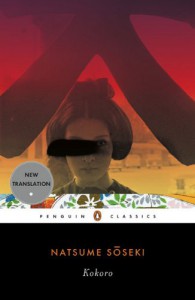the reader in a quiet corner
hi, i'm ceecee. my reading interests can be described as eclectic.
i made this account just in case goodreads implodes, but will be eratically updating here.
 You like Japan? Read Natsume Soseki.
You like Japan? Read Natsume Soseki.I hope I don't sound racist when I recommend this to people who like that "Japanese melancholic vibe" as if all Japanese people are morose or anything. I grew up loving anime, and if you are familiar with anime, you'll know anime is weird but hilarious all the same. But then, I also watch Japanese films and they are pretty damn melancholic. These bittersweet films with simple themes that just make your heart ache. I really think it's characteristic of "Japanese" just as much as their quirky anime and game shows. And I suppose they are two sides of the same coin - the hilarity in juxtaposition of its melancholy.
I think Kokoro is indeed very "Japanese". I enjoyed reading it because I enjoy the simple serenity and directness of Japanese media. In fact, while I was reading this, I imagined I was watching a Japanese film. Circa time of Memoirs of a Geisha, and my beloved Rurouni Kenshin.
Also, Kokoro was authored by one of the most popular Japanese novelist of all time, and if you even had a little interest in Japan, you would know Kokoro. From what I understand in its Introduction, this novel is widely known to everyone in Japan.
It tells of the life of Sensei in the time the narrator, a young man, meets and befriends him and of the shadow that plagues Sensei's existence.
Now comes the hard part where I have to go through that intellectual detail that the novel is really about. I am utterly unreliable in this area. Is it enough to say "Read the Introduction after you read the novel?"
Kokoro was published in 1914, and the events in the novel were set in 1912, around the time emperor Meiji died. The Meiji era signaled a new era in Japan - the opening of Japanese gates to Western civilization and an end to feudalism and the samurai way. *Insert intricacies of Japanese history and culture*
In my own innocent understanding: It's about the conflicts of the old and the new.
And it's also about human relationships and moral dilemmas.
...
...
...
Ugh, I just can't review this properly.
It's a pretty good novel, okay? Even with its flaw. I friggin love that melancholic vibe. So yeah, *4 stars.



